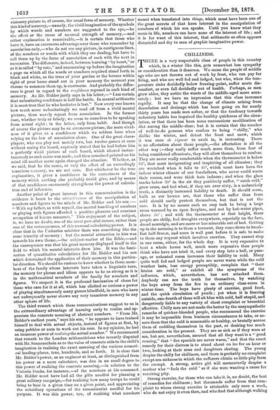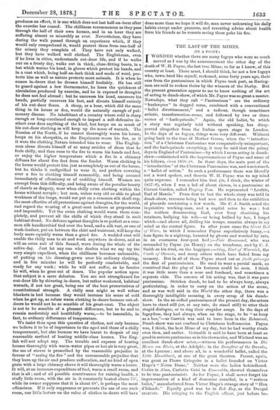CHILLINESS.
THERE is a very respectable class of people in this country which, in a winter like this, gets somewhat less sympathy or consideration than it deserves. We mean the people of middle age who are not thrown out of work by frost, who can pay for firing, and who are well fed and lodged, but who, when the tem- perature sinks decidedly below freezing-point, suffer acute dis- comfort, or even fall decidedly out of health. Perhaps, as men grow older, they notice the wants of the middle-aged more accu- rately; but we have an impression that this class increases rapidly. It may be that the change of climate arising from denudation and drainage which has been going on for nearly thirty years has made men softer, or that the tendency towards sedentary habits has impaired the healthy quickness of the circu- lation, or that there has been some unconscious modification of diet among the middle-class; but it is certain that the number of well-to-do persons who confess to being "chilly," who dislike the winter, and detest the frost and snow, which it was once de rigueur to exult in, is increasing. There is no affectation about these people,—the affectation is all the other way ;—they really suffer much more than, from fear of being considered effeminate, they will allow themselves to confess. They are never really comfortable when the thermometer is below 64°, that most invigorating and inspiriting of all climates ; they are wretched when it falls to 40°, which must have been the indoor winter climate of our forefathers, who never could warm their rooms, and wore thick hats indoors ; and when the glass marks below 30° in the air they positively suffer, "catch cold," grow cross, and feel what, if they are over sixty, is a melancholy truth, a distinctly increased liability to death. It should seem, built as our houses are, that those who suffer thus from cold should easily protect .themselves, but that is not the case. It is by no means such an easy task to bring a large room warmed by an open fireplace, and not by hot-water pipes, above 50°; and with the thermometer at that height, these people are chilly, feel draughts everywhere, especially on the face, dread neuralgia, and are more or less miserable out of bed. Getting up in the morning is to them a torment, they come down to break- fast half-frozen, aud noon is well past before it is safe to make to them any request which involves exertion. They cannot stop in one room, either, for the whole day. It is very expensive to heat a whole house well, much more expensive than people think who have not tried it, and every step into a hall, or pass- age, or unheated room increases their liability to cold. Many quite well fed and lodged people are never warm while the cold weather lasts, lose energy perceptibly, complain that "their brains are cold," or exhibit all the symptoms of the influenza, which, nevertheless, has not attacked them. Anybody can see the truth for themselves, by watching the boys away from the fire in an ordinary class-room in winter-time. The boys have plenty of exercise, good food, and the quick circulation of youth ; yet when it is freezing outside, one-fourth of them will sit blue with cold, half-stupid, and dangerously liable to any variety of chest complaint or bronchial affection. Chilly men are not made the better by the unsympathetic remarks of quicker-blooded people, who recommend the exercise it may be impossible from business circumstances to take, or as- sure them that the cold is seasonable or healthy, or brutally accuse them of coddling themselves in the past, or desiring too much consideration in the present. They are as sick as if they were at sea, but are, nevertheless, assured that all they want is a "good rousing," that "fire spaniels are never warm," and that the exact remedy for their distress is to stand about on ice for an hour or two, looking at their sons and daughters skating. The young despise the chilly for chilliness, and there is probably no complaint except sea-sickness in which the sufferers obtain so little pity from the exempt. A strong, active girl will momentarily despise a mother who "feels the cold" as if she were wanting a cause for receiving pity.
Strong exercise, for those who can take it, is, no doubt, the best of remedies for chilliness ; but thousands suffer from that com- plaint to whom strong exercise is attainable only once a week, who do not enjoy it even then, and who find that although walking produces an effect, it is one which does not last half-an-hour after the exercise has ceased. The chilliness recommences as they pass through the hall of their own houses, and in an hoar they are suffering almost as miserably as ever. Nevertheless, they have -during the walk passed through an experience which, if they would only comprehend it, would protect them from one-half of the misery they complain of. They have not only walked, but they have walked well clothed. The Englishman, even if he lives in cities, understands out-door life, and if he walks out on a frosty day, walks out in thick, close-fitting boots, in a bat which warms his head, in gloves which protect his hands, and in a coat which, being half-an-inch thick and made of wool, pro- tects him as well as nature protects most animals. It is when he comes in-doors that he dresses himself foolishly. Ile has still to guard against a low thermometer, he loses the quickness of circulation produced by exercise, and he is exposed to draughts he does not feel abroad ; but he uncovers his head, uncovers his hands, partially uncovers his feet, and divests himself entirely -of his out-door fleece. A sheep, or a bear, which did the same thing in its house or den, would die naturally enough of pul- monary disease. No inhabitant of a country where cold is sharp enough or long-continued enough to impart a self-defensive in- stinct ever does anything of the kind, but keeps on as much of his out-door clothing as will keep up the sense of warmth. The Russian of the North, if he cannot thoroughly warm his house, keeps on his sheepskin, as the Esquimaux wears his fur, as if it were the clothing Nature intended him to wear. The English- man alone divests himself of so many articles of dress that he feels chilly, and then runs to the fire to warm his hands and feet, 4)r enjoy the higher temperature which a fire in a chimney diffuses for about five feet from the fender. Warm clothing in the house would protect him just as completely as out of the house, but he thinks it undignified to wear it, and prefers cowering over a fire to clothing himself reasonably, and being accused immediately of effeminacy or of coddling himself. Women are exempt from this difficulty, and being aware of the peculiar beauty -of shawls as drapery, wear when chilly extra clothing within the house without scruple ; but men, unless very old or able to plead weakness of the lungs, would not put on a common silk skull-cap, the most effective of all protections against draughts, for the world, and regard the wearing of a great-coat indoors as preposterous and impossible. Yet the extra clothing would warm them com- pletely, and prevent all the chills of which they stand in such habitual dread. No defence against draughts is so perfect as a com- mon silk handkerchief tied over the head, and a silk vest, or one of wash-leather, put on between the shirt and waistcoat, will keep the body more equably warm than a good fire. A wadded coat will enable the chilly man to sit and work anywhere in-doors, and so will an extra suit of thin flannel, worn during the whole of the active day. Just let any one who doubts what we say try the very simple expedient, when the chilliness becomes unbearable, -of putting on his dressing-gown over his ordinary clothing, and in five minutes he will be perfectly comfortable, and ready for any work ; while he will not suffer, as he fancies he will, when he goes out of doors. The popular notion upon that subject is a mere delusion. You are not strengthened for out-door life by shivering in-doors, but rather weakened, habitual warmth, if not too great, being one of the best preservatives of constitutional strength. A chilly man might as well refuse blankets in bed because they would increase his sense of cold when he got up, as refuse warm clothing in-doors because out-of- doors he would not be so sensible of his great-coat. The object is not to be sensible of a pleasant difference, but to be and to remain moderately and healthfully warm,—to be insensible, in fact, to ordinary differences of temperature.
We insist thus upon this question of clothes, not only because we believe it to be of importance to the aged and those of a chilly temperament, but also because we have learnt to despair of any reasonable method of heating middle-class houses. The Eng- lish will not adopt any. The trouble and expense of heating houses thoroughly with warm-water pipes or hot air is very great, the use of stoves is proscribed by the reasonable prejudice in favour of "seeing the fire" and the unreasonable prejudice that they burn up the air and produce suffocation, and no kind of open grate with a large chimney above it will thoroughly warm a house. It will, at an immense expenditure of fuel, warm a small room, and that is all ; and of all possible contrivances for ruining health, a stuffy little room, with the air in it constantly heated above 75°, while its owner supposes that it is about 68°, is perhaps the most efficacious. If it only suppresses or prevents the use of one such room, our little lecture on the value of clothes in-doors will have done more than we hope it will do, man never unlearning his daily habits except under pressure, and resenting advice about health from his friends as he resents seeing them poke his fire.



































 Previous page
Previous page